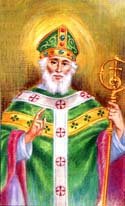
Saint Patrick's Day is not only a day for celebration of things Irish, but a day to remember the Saint himself. In the 5th century, Patrick was abducted and sold into slavery in Ireland. He escaped after six years (during which time he learned Celtic), returned to Britain, studied for the ministry, and eventually returned to Ireland to convert its people to Christianity. It has been suggested that because of their devotion to St. Patrick, the Irish have been especially opposed to slavery.
I suggest that there is no better way to commemorate Saint Patrick, than to work against slavery in his honor!
I suspect Irish antipathy to slavery is most directly a result of the centuries in which Ireland was ruled by the English, during which time the majority of the population was often forced into involuntary servitude. Irish history tells Ireland's people what slavery really feals like. I have read that there was a close relationship between Irish indentured servants on Caribbean islands and black slaves, perhaps a sign of this understanding. Moreover, I have read that there were riots in the United States as immigrant Irish after the Potato Famine of the 1840's fought for survival. The Irish were of so little value that they were given jobs too dangerous to give to slaves, who after all were worth money on the market. The Irish rioted for a chance at the good jobs held by the slaves!
I have been reading King Leopold's Ghost by Adam Hochschild. It tells the story of the enslavement of millions of Africans in what came to be known as the Belgian Congo. The degredation and cruelty described are almost unimaginable. The book also tells the story of Roger Casement, an Irishman who exposed the involuntary servitude of the Congolese in a major report, who fought against slavery in the Congo and in the Putomayo for decades, and who became an Irish revolutionary. He saw the parallel between involuntary servitude in Africa and lack of self determination and freedom in Ireland. Ultimately, he was executed by the English as a rebel.
The Washington Post reports that:
The U.N. General Assembly voted overwhelmingly Wednesday to create a human rights agency to monitor and expose abuses by governments, replacing a discredited body despite objections by the United States that nations with a history of human rights violations could still join the new panel.The United States opposed the action, stating that is wanted a still more dramatic organizational reform, that would further enhance the role of the United Nations in protecting human rights. Still Reuters informs that the United States' government "has vowed to work with the new council despite its vote against Wednesday's resolution". Let us hope that the United Nations will in fact, some 1,600 years after Saint Patrick, help to finally end slavery. And let us hope that the United States will in fact contribute substantially to that effort!
The assembly's action will effectively abolish the United Nations' main human rights body, which has been derided in recent years for allowing some of the world's worst rights abusers to participate. It will be replaced in June by a new Human Rights Council, which advocates and most nations hope will exclude brutal dictatorships and do a better job of confronting governments that abuse their own people.
I just posted a message (UNESCO News: Education and Culture) on the role of UNESCO in promoting the international understanding of slavery, and in conserving the awareness of slavery in all men.
In the meantime, I hope that people will support efforts of Civil Society organizations such as Ashoka Changemakers to End Human Trafficking.
Happy Saint Patrick's Day to my readers, and may those now in involuntary servitude see happier days in the future.
No comments:
Post a Comment